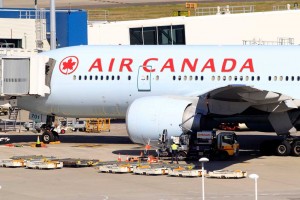Photo Source: Photograph by Rick Rycroft, Associated Press Retrieved on September 22nd, 2014 http://www.edmontonjournal.com/business/Canada+joins+WestJet+charging+checked+domestic+flights/10214182/story.html
The Air Canada and Westjet duopoly in Canada makes it easy to overcharge customers for services on top of their already expensive airfares. Consumers are unable to push back and force change in these airlines decisions because Canada lacks competition in this industry and these airlines are well aware of the unwavering high demand for their services.
This article peaked my interest because I am constantly flying from Vancouver to Edmonton throughout the school year. This added $25 fee, though not much once or twice, eventually adds up. Without choice in airlines, I will be forced to pay this fee for checking baggage every time I fly home. This new additional fee only applies to those flying in the economy class. These subtle changes over time may eventually lead to a shift in people purchasing seats in business class over economy class, ultimately generating more profit for the company. When the Transat Inc. CEO stated, “We will look everywhere we can to make more profit,” it was evident that airlines put a higher importance on profit than their customer service. These big companies are willing to cut corners and take advantage of customers to make a profit and remain competitive globally, not a very comforting thought when you are in their aircrafts thousands of meters above ground.

